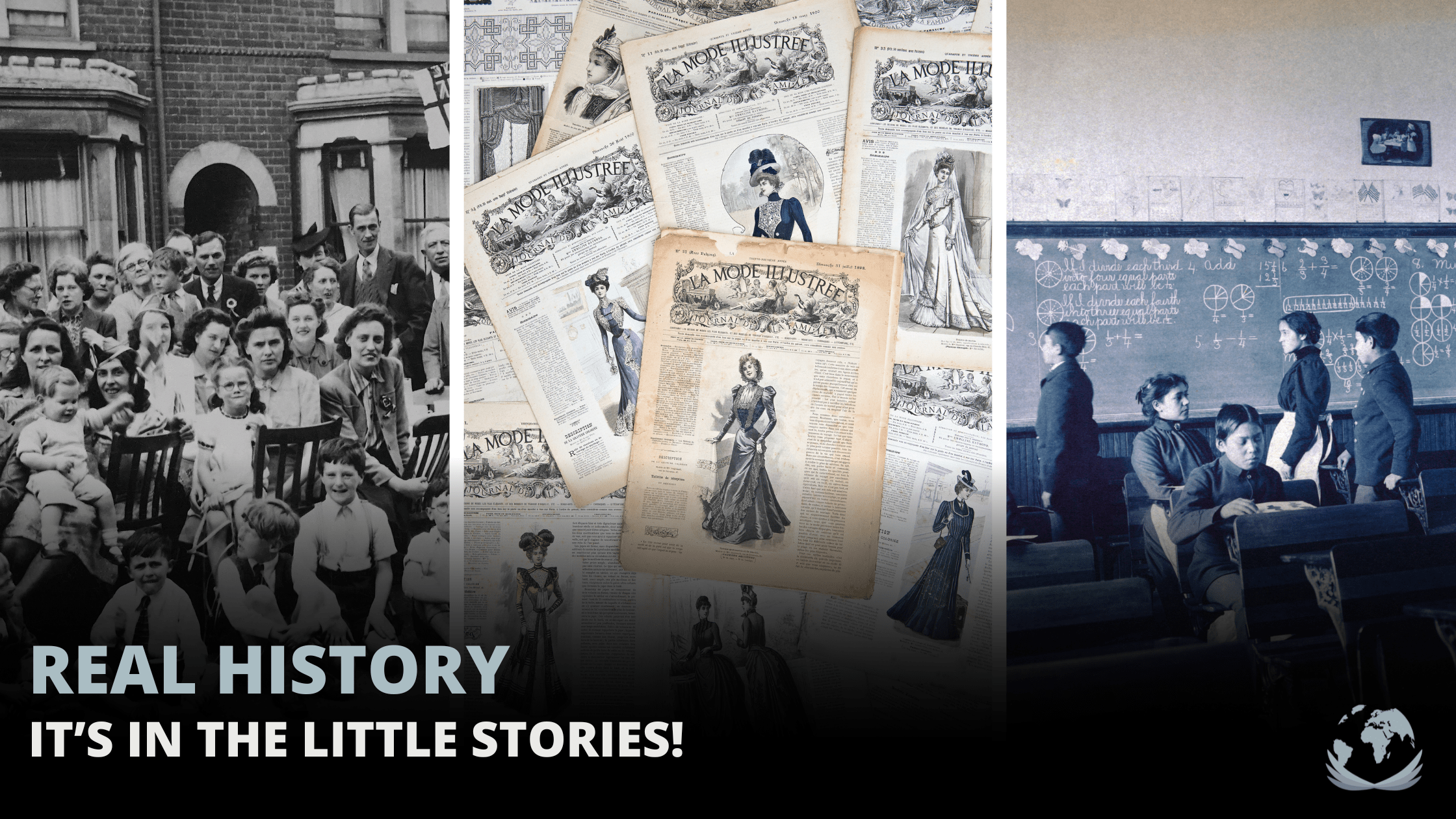Real History - It’s In The Little Stories
I have always loved history, but, please, spare me the names of kings and queens and the dates and places of battles, the stories of the rich and powerful! That bored me to tears! What has always grabbed me was wondering what it was like to live in a certain time, a certain place. I was always interested in the history of ordinary people - what life is like in that time or place - what sort of food is eaten, what are the schools like, what sort of clothes do people wear, what does it look like, smell like and feel like?
I wanted to know what it was like for my parents to experience the Great Depression. How did my mother’s parents go from being wealthy to all of a sudden losing their home and moving in with relatives? What was it like to go from being rich to poor? Did they know people who jumped off of buildings when the stock market crashed? How did they manage to put food on the table and how long was it until they were able to get back on their feet? Were there bread lines? Could they still go to school? And what was it like during World War II? What was it like to have sugar and gasoline rationed and was my mother’s family worried because they had a German surname? What was it like for my mother to join the war effort as a chemist and then when the war was over and the men came home, to no longer have a job? What was it like for my father to go to medical school during the war, knowing that he might be on the front lines when he graduated?
And what was it like for my grandmother to lose her mother and siblings during the Diphtheria epidemic and then to be sent off to live with relatives far from home because her father didn’t think he could raise children without a wife? What was it like for my grandfather to build a brand new town? What was it like to have the first car in that town? What was it like to leave a homeland and start over in a new country?
What is it like to live in your time, in your place? But just because you tell us what it is like for you, that will never be the whole story because your neighbor will have a different experience, a different perspective. Even with a very small town, everyone’s experiences are valid, important and different and yet all of them together paint a fuller picture than any one alone of us could present.
Life, real life, is what ordinary people experience. It’s not about kings and queens and battles or even IPOs and corporate mergers. It’s the people’s history that matters. It’s about eking out a living, getting kids an education, staying healthy and maintaining families. And all of that, as similar as those journeys may be over eons, they change significantly in how all of that happens. Eking our a living in 1933, at the height of the Great Depression was very different from eking out living in 2020, as was staying healthy (remember there were no antibiotics until the 1940s), and maintaining family ties. And so if we want to know what life is like, we have to go beyond the names and dates of the rich and powerful to the smaller stories of ordinary lives, of life on the ground. Imagine millions of small stories of ordinary life and what a powerful depiction of real history that would be! That is precisely what we are building at History Chip. The history ordinary people - of real life as most of us have lived it.
Below are excerpts of two stories of ordinary life, one by Elsie Johnson and another by David T. Daniels.
Keeping Food
A story by Elsie Johnson
Kept it in an ice box which had a drip pan that had to be emptied every day! The Ice Man would deliver blocks of ice in various sizes. He would have the truck stop at all the houses which displayed a card indicating the size of ice you wanted - 25 50 - 100 lbs. He would bring it into the kitchen carrying it with tongs over his shoulder covered with a leather cloth. As he chipped the ice in his truck, we would wait patiently for him to give us chips to suck on - what a treat! We would wait for the ice man to come like the children of today waited for the ice cream man. Food was kept wrapped in wax paper or a container in the icebox. My mother would keep fresh vegetables in the cool dark area of the basement. My parents kept a large garden with several fruit trees. Most of our food was raised in the garden. Mom would put a pot of water on the stove to boil then go out to the garden to pick the corn - that was fresh food!!!! She would can 50 qt. of tomato juice. She canned beans, peaches, apple sauce, relishes. Everything was neatly stored in the basement. Mom would bake bread while we were in school. We would come home for lunch and the aroma of fresh bread was wonderful!! Cinnamon rolls were our favorite! She would say You can't just eat bread - you have to have a balanced diet!
Clothing
A story by David T. Daniels
As a farm boy, my clothing was pretty limited. It consisted of one pair of shoes and some homemade trousers and shirts. Of course, for most of the time I was barefooted. I can remember having my shoes half soled, meaning no heel repair. The town cobbler did this for $0.25. My brother and I would always go together, with him paying the $0.50. My mother just didn’t trust me with money. During those early twenties, my mother made dresses for my five sisters. She would buy a large bolt of white cloth and sew and sew with that old Singer. I can remember her constantly dying clothes in a large outside vat. As they grew into the 1930’s they bought their dresses from catalogs and the mercantile store.
It’s the small details of these stories that give us so much understanding of life in the 1930s. These aren’t big important stories about thrilling adventures or bold accomplishments. These are stories that all of us can relate to as they explain real life and that is what is meant by a people’s history. As we read, we can picture their lives, their homes, their clothing. And this is history, precious history that will be lost if we don’t tell our stories. And these are easy stories to share. Our stories matter. We can’t wait to read yours! Share your story!

